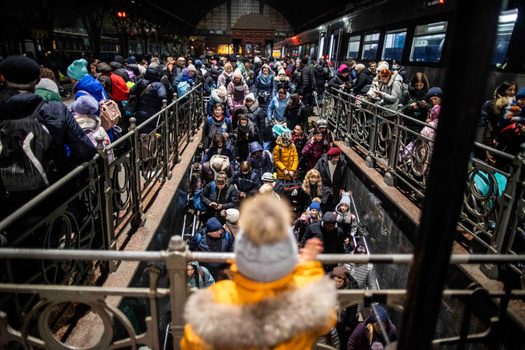
Between chaos and order Meduza reports from the ground in Lviv, western Ukraine’s waypoint for hundreds of thousands of refugees
Мы говорим как есть не только про политику. Скачайте приложение.
Hundreds of thousands of Ukrainian residents fleeing Russia’s invasion have traveled to Lviv, a city near the Polish border that was previously home to about 720,000 people. Lviv has experienced air raid sirens, but it hasn’t seen active fighting on the scale seen in cities further east. Some displaced people have decided to stay there in hopes of waiting out the war. Others have continued onward to EU countries: Poland alone has received more than 885,000 people, according to the UN Refugee Agency. Journalist Andrii Ianitskyi was among those who fled rocket attacks in Kyiv for the relative safety of Lviv. Meduza asked him to explain how the city has become a place of refuge for people from all over Ukraine.
Please note. This article was originally published in Russian on March 4, 2022.
Six days on the road
I got to Lviv late in the evening on March 2, shortly before curfew started at 10:00 o’clock at night. I stopped my car at a checkpoint, turned off my headlights, turned on my blinkers, rolled down my window, and started getting my documents ready for inspection. It was a procedure I’d performed dozens of times since the beginning of the war. At every checkpoint, local police officers and territorial defense forces check people’s documents and inspect their vehicles, trying to catch potential saboteurs working for Russia.
I left Kyiv with my six-year-old son, my wife, her mother, and our cat. I drove them to the Moldovan border, where we got stuck for days in an enormous traffic jam. We had to sleep and eat in the car. People from Mohyliv-Podilskyi, a town near the border checkpoint, were running a mobile kitchen and giving out sandwiches, borscht, kasha, and tea with sweets around the clock.
Because I’m a man of service age, I had to stay in the country. After my family crossed over, I dropped off our cat with friends in the Cherkasy region, where it’s still peaceful. I left from there for Lviv, where my TV company Espreso has temporary relocated. The whole trip took six days — you can’t travel at night because of the curfew, and there are huge traffic jams at every checkpoint.
In the eight days since the Russian military invaded, Ukraine’s cities and towns have turned into fortresses: there are barricades on the way in and out guarded by armed territorial defense patrols. There are checkpoints on the country’s main highways, too, with long lines of cars around each one. But for some reason, there was no line as I made my way into Lviv. A tired-looking territorial defense officer in camouflage was carrying his machine gun from car to car, shining a flashlight into people’s windshields and waving them along.
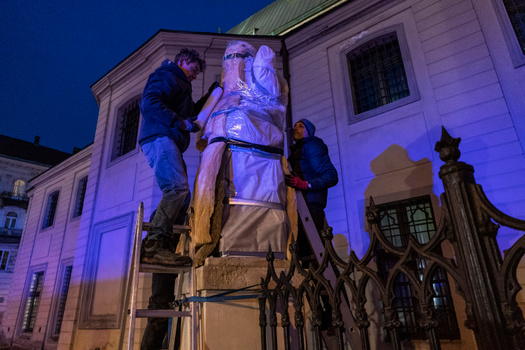
The final road into Lviv was completely dark — the streetlights had been turned off so that nothing could be seen from the air. When I finally reached the city, the sight of it was astounding: the lights were on, gas stations were still operational, and even the coffee shops were open.
I parked in a residential neighborhood not far from the airport and went up to a unit on the top floor of a newly built twelve-story apartment building. It’s almost impossible to rent an apartment in Lviv nowadays, but a generous group of locals are letting displaced people stay with them, and there are various NGOs in town helping people find temporary housing. As soon as I crossed the threshold of the apartment, an air raid siren turned on, but I didn’t have enough energy left to run down to the basement.
Volunteers
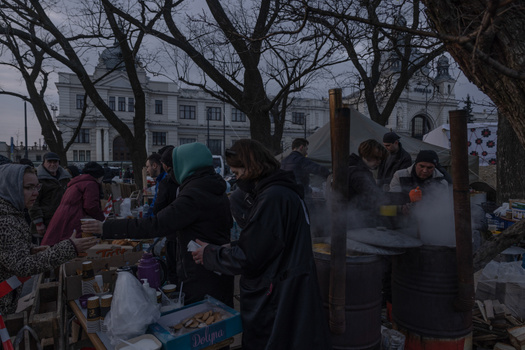
My apartment had been rented out by an organization called the Lviv Media Forum that was helping evacuated Ukrainian journalists. People are always moving in and out, but right now, there are two of us living in the unit: myself and Mitya Kobrinsky.
Mitya is a curly-haired 38-year-old from Odesa. He wears glasses and speaks Russian. He’s a graphic designer who has also published some children’s books. Mitya went to college in Moscow and met his wife there — Nastya, a Russian citizen, is a professional icon painter. In 2013, they had a son, Matvei, and decided to move from Moscow to Odesa. After the invasion of Crimea and the Euromaidan in 2014, they decided not to go back to Russia.
“It would have been possible to live there and lie low, but that would have meant compromising our conscience,” Mitya told me.
At 5:00 in the morning on February 24, Mitya and Nastya woke up to the sound of explosions. They hadn’t left home in 24 hours — they had just been reading news about the invasion and waiting for Mitya’s mother to arrive in Odesa from the Kyiv suburbs. On the evening of February 25, they bought train tickets to Lviv.
“I was hunting for tickets on the booking website for three hours, and then when we got to the station, we realized the conductors were letting anybody on who wanted to go,” Mitya said. “In the compartment next to us, there were about ten people with all their dogs and cats. I don’t know whether they paid the conductor or not, but there were definitely more people than seats.”
Mitya’s family had already crossed the Polish border the night before I got to Lviv. He stayed back to help other displaced persons. In the meantime, local volunteers on the Polish side had led his family to a minibus that was giving food and rides to new arrivals. They were taken to a school whose gym had been converted into temporary overnight lodging.
There are volunteers greeting new arrivals in Lviv as well. “Lviv is so kind and fantastic. People help everybody here. I’d only visited as a tourist before, but now it’s basically the Tower of Babel. Everyone’s coming here from everywhere,” Mitya told me.
During the day, Mitya volunteers with the Red Cross at the Lviv train station. Traffic into the station is at a standstill all the way from downtown, and it can take several hours to get through. Some people can’t take the wait: they unload their suitcases out of their cars and head for the station on foot, which is faster.
The inside of the station is packed with thousands of people. There are lots of volunteers here, too, but chaos reigns regardless.
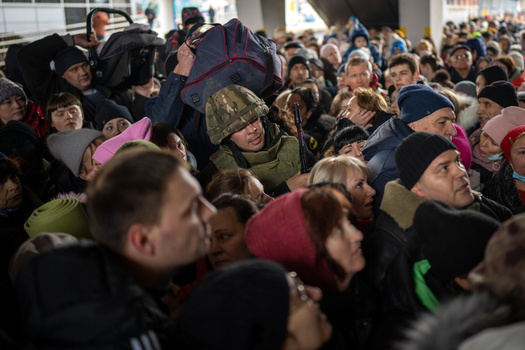
I see an elderly woman crying: she has just arrived from Kharkiv with her granddaughter, but they lost each other in the crowd. Volunteers try to calm her down and promise to find the little girl.
I see a family with children: they missed the bus to the border, and now the father is trying to find another way to get there. “There are two seats on BlaBlaCar, but that’s not enough,” he says aloud to himself.
There’s a group of African students who don’t know where to go. They’re asking who can speak English and point them in the right direction, but everybody just shrugs.
People have been arriving in Lviv on free evacuation trains from Kyiv, Kharkiv, and other cities that have been devastated by the bombings. Volunteers have set up big tents near the station where people can warm up and get food, water, warm blankets, and clothes. Some people are gathered around metal barrels where fires have been lit for warmth. There’s an upright piano outside the station that wasn’t there before, and people take turns playing.
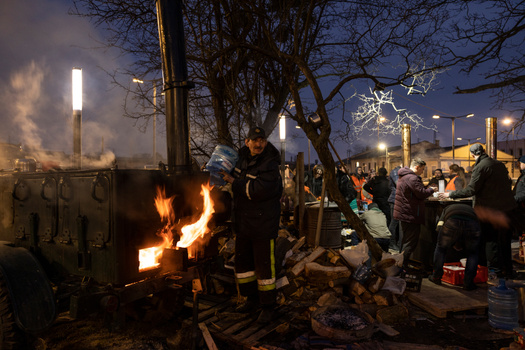
If somebody wants to stay in Lviv, the volunteers give them a list of addresses where they can sleep for a while—schools, hostels, university dorms, and sanatoriums. There are also open beds at the Lviv Art Palace and at the Lion Arena soccer stadium that was built for Euro 2012. Refugees have to get to these temporary camps themselves, unless they run into someone with a car who’s willing to take them for free. For those who want to continue onward into the European Union, there are free buses to the border.
“It’s odd that, even with all this chaos, there’s still some kind of working system,” Mitya said.
In just eight days, more than a million people have left Ukraine. Men between 18 and 60 are only allowed out in exceptional cases — for example, if they have a large number of children, or if they are traveling alone with their kids.
Ukraine has also seen reverse migration: the Border Service reported that 80,000 people, mostly men, had crossed back into the country [as of March 1].
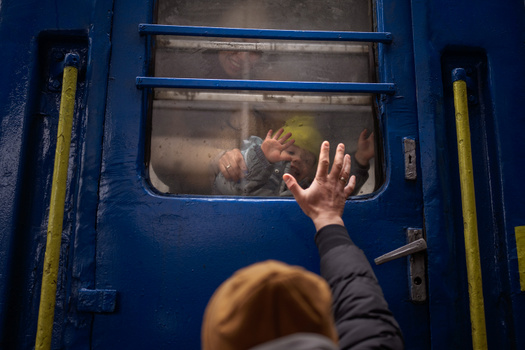
Charu
Charulata Sandar is a fourth-year student at Kyiv Medical University. She’s an Indian citizen from the southern state of Tamil Nadu, but she had been living in Kyiv until the war changed everything on February 24.
“I heard explosions, and our embassy was warning us that things might escalate, so I was prepared to leave. There are two children in our family: me and my brother. My brother’s a veterinary student in Lviv, so I left to stay with him,” she said.
When asked for her impression of this new host city, Charu said, “Lviv is amazing.” She told me she feels safer here than in Kyiv and added that the people are “marvelous.”
On March 1, CNN and Euronews reported on Ukrainian border guards discriminating against people from Africa and India who were trying to leave the country. International students posted online and spoke with journalists about being kept off of bus transports and being forced to walk on foot to border crossings, where they were sometimes prevented from leaving or made to wait for hours. Some reported that they had been beaten. State-owned Russian media outlets eagerly picked up the story even though the students were all fleeing the Russian military invasion.
Charu said she hadn’t yet experienced this kind of discriminatory treatment. “Ukrainians have been giving me food and water on the way. They’ve been helping me. Of course, these incidents are possible — everyone is under stress right now — but these conflicts are probably happening because people are prioritizing help for families with children and then helping foreigners,” Charu said.
In Lviv, she is staying in her brother’s dormitory, but her journey isn’t over. Charu plans to continue westward into Europe, but she doesn’t plan to return to India without her medical degree.
“I have no idea what’s coming next. I have my student ID and a reference from my university, and that’s it. I don’t know whether I’ll be able to finish my studies in Europe. What I want most is for everything to go back to the way it was. I want to go back to Kyiv,” she said.
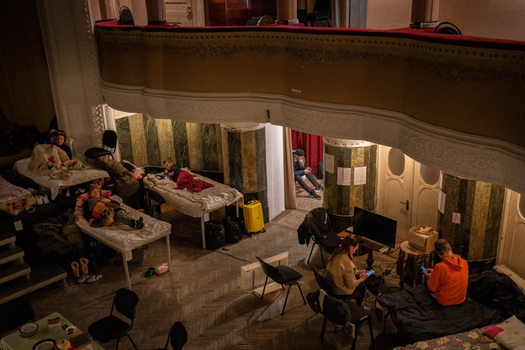
‘Bandera’s town’
Thirty-three-year-old Oxford graduate Rostislav Averchuk rode the patriotic wave of the 2014 Euromaidan back to his hometown, Lviv. Before the war, he worked as an economic analyst, but now he’s reconsidering his career path.
“The war made everything click into place. There’s this new realization that I’m needed, that I can help—and there’s a new kind of rage against Putin,” Rostislav explained.
His father is a cardiac surgeon in the Lviv Regional Clinical Hospital, which is taking in every “complex” case from war-torn Kyiv. Medicines quickly became scarce, and Rostislav started up an online fundraising campaign for donors from abroad to support the hospital’s charitable foundation. He has also volunteered at the train station, joined local clothing drives, and helped buy body armor for the territorial defense:
“I’m not doing much. Other people are doing a lot more. I know a family that took in 20 people at once. It feels a lot like the Maidan — everyone is mobilizing everything they’ve got, and everybody wants to help however they can. People are showing the best parts of themselves, following all the rules, making a point of being polite to one another,” Rostislav explained. “A while ago, I went into a pharmacy without a mask on, but then I looked around and saw everybody wearing masks properly, over their noses. You would think that, with a war on, people would forget about all these coronavirus restrictions, but people are actually still following them.”
The first migrants arrived in Lviv even before the war began, Rostislav told me. They had seen warnings of a possible Russian invasion in the news. Some people came right after the first bombardments, first from Kyiv and then from Kharkiv.
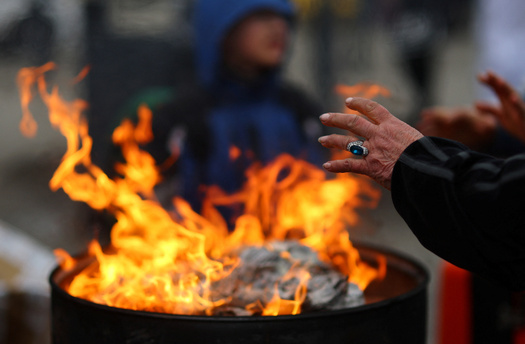
Even though Rostislav says the war hasn’t significantly affected daily life in Lviv so far, he still feels a sense of danger.
“Putin has been using the word ‘denazification.’ He’s been talking about [twentieth-century far-right ultranationalist leader Stepan] Bandera. In that mythology, Lviv is Bandera’s town,” Rostislav continued. “Who knows what kinds of surprises he [Putin] has in store for Lviv. So there is some concern, and some people who live in Lviv are heading for the border, too.”
Story by Andrii Ianitskyi, reporting from Lviv, Ukraine
Translation by Hilah Kohen